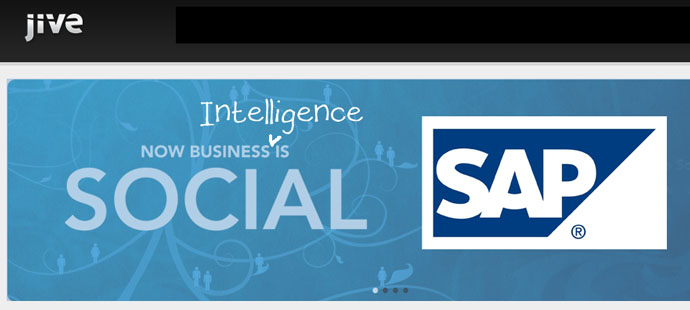
We’re used to seeing IT industry megavendors such as SAP augment their solutions with web 2.0 technology from smaller vendors, but now one of the leading enterprise 2.0 companies is turning to SAP for a cloud computing offers to extend new capabilities to customers.
At the Enterprise 2.0 2009 event in Boston, Jive and SAP announced that Jive is going to be a reseller of SAP’s on-demand BI solutions, providing “social BI” to their customers.
SAP has long been a customer of Jive Software’s Enterprise 2.0 collaboration platform, notably to power the forums on the SAP Development Network, and SAP’s Collaboration Workspace, and a few years ago SAP signed an OEM agreement to include Jive Forums as a standard part of the SAP NetWeaver portal application.
This announcement is a clear sign of the growing maturity of the enterprise 2.0 market, in two different ways.
First, it’s the first concrete results of SAP’s increased focus on the web 2.0 market, and in particular the investment in the SAP BusinessObjects portfolio of products, designed to transform the work of “business users” in the same way that ERP has transformed operational processes.
SAP BusinessObjects was one of the early pioneers in the on-demand business intelligence market, with a flexible platform that provides the best of both worlds: customers can use the same technology platform in a mix of on-demand or on-premise configurations, and move smoothly between the two. SAP’s agreement to partner with Jive is non-exclusive: the on-demand BI software is already used within other partner solutions including Oco.
Second, it shows that enterprise 2.0 solutions are real, and providing value in organizations. Jive’s 3,000 customers include many large organizations, that have been gathering valuable data about how companies collaborate internally and engage with customers and partners externally. As with any successful business process, they now want to examine and optimize that process, and mine that data with best-of-breed business intelligence tools.
These two trends were echoed by Susan Scrupski of ITSInsider, in her post And They’re Off. A Postcard From Enterprise 2.0 Event:
“This new venture, however, marks a clear initiative by SAP to (finally) take social software seriously, and likewise, it provides a grownup capability for a social software platform like Jive to deliver some clear business benefit.”
I believe business intelligence is an essential part of any successful enterprise 2.0 initiative, in order to:
Provide statistics on usage trends. Business intelligence helps proactively identify any technical or social roadblocks to effective deployment of collaboration tools, answering questions such as:
- When are the peaks and troughs of user activity? What causes them?
- Who has access to the system but is not using it?
- Which users have recently stopped using the system? Do they share any common characteristics?
- Are there any regular occasions where particular groups don’t use the system? Why?
Prove the ROI. Business intelligence functionality will help provide the data required to prove to skeptics of the value of collaboration and social computing inside organizations.
- Are users of the system more likely to get better (or worse) employee evaluations or bonuses?
- What’s the correlation between any groups of identified “top performers” and system usage?
- Do sales people who use the system achieve quota faster than sales people that do not?
- Does using the system replace other types of internal information dissemination, such as attending internal web seminars, or does it complement it?
- Is there any correlation between system use and employee or customer satisfaction?
- Are customers that engage in collaboration more or less profitable?
Optimize social relationships. If enterprise 2.0 software generates return on investment, it follows that it makes sense to try and optimize its use. Business intelligence systems can help decide where the network of relationships between employees, customers, and partners can be improved:
- Are there certain key “connectors” that provide a valuable service, but are not being recognized as such within the organization?
- Are there any groups of people that collaborate among themselves, but not with the rest of the organization? (e.g. bosses that frown on “their team” working with other departments)
- Do similar groups (such as regional sales offices) have different patterns of relationships? Why?
- Are there people that seem to be a negative influence on relationships within the organization? (e.g. detecting “bad bosses”
- Did the new bonus or incentive system we just introduced stop people collaborating?


Analyzing sentiments. Collaboration technology generates a lot of textual information that can be analyzed using technology such as SAP BusinessObjects’ Text Analytics, for analyzing the sentiment of customers, partners, and employees, about products, processes, or the collaboration system itself.
Note that in every case, it’s not enough to have information just from the collaboration system – it must be combined with information from other key financial and HR systems in order to get a full view of what is happening. This means that organizations must have a strategic approach to implementing business intelligence across the organization.
You can download Jive Software’s “Social Business Imperative Manifesto” here. And any organizations interested in trying out the SAP BusinessObjects ondemand solutions can click here to sign up for a Starter edition account.
Links and Other Analysis
Mary Hayes Weier of Information Week: Enterprise 2.0: SAP, Jive Combining BI With Wikis
Chris Kanaracus of IDG News Service: Jive, SAP Partner on ‘social BI’
Alex Goldman, InternetNews.com, SAP BusinessObjects integrates into Jive
Barb Mosher, CMS Wire, Jive Integrates SAP’s onDemand Business Intelligence Offerings
Oliver Marks, ZDNet Blogs: Jive & Telligent Get More Analytical
Susan Scrupski, ITSInsider: And They’re Off. A Postcard From Enterprise 2.0 Event

Comments
One response to “Social BI: Jive Chooses SAP’s On-Demand BI Platform”
[…] CRM — or tracking social communities. For example, Jive, the leader in Enterprise 2.0 platforms, offers our BI products as part of their solution, to help their customers analyze and optimize use of the system. Administrators can track if usage […]